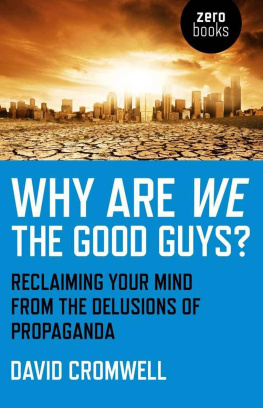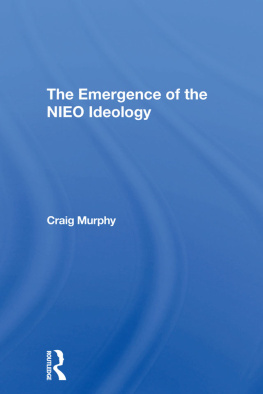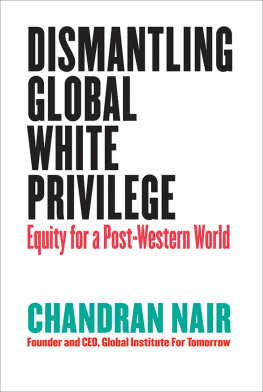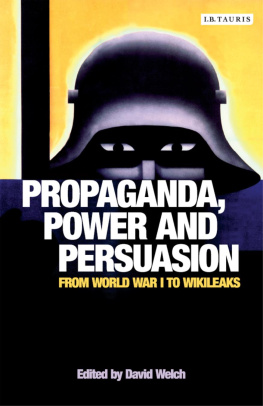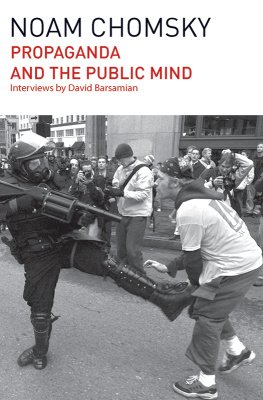David Cromwell - Why Are We the Good Guys?: Reclaiming Your Mind From the Delusions of Propaganda
Here you can read online David Cromwell - Why Are We the Good Guys?: Reclaiming Your Mind From the Delusions of Propaganda full text of the book (entire story) in english for free. Download pdf and epub, get meaning, cover and reviews about this ebook. City: Lanham, year: 2012, publisher: John Hunt Publishing, genre: Politics. Description of the work, (preface) as well as reviews are available. Best literature library LitArk.com created for fans of good reading and offers a wide selection of genres:
Romance novel
Science fiction
Adventure
Detective
Science
History
Home and family
Prose
Art
Politics
Computer
Non-fiction
Religion
Business
Children
Humor
Choose a favorite category and find really read worthwhile books. Enjoy immersion in the world of imagination, feel the emotions of the characters or learn something new for yourself, make an fascinating discovery.
- Book:Why Are We the Good Guys?: Reclaiming Your Mind From the Delusions of Propaganda
- Author:
- Publisher:John Hunt Publishing
- Genre:
- Year:2012
- City:Lanham
- Rating:5 / 5
- Favourites:Add to favourites
- Your mark:
- 100
- 1
- 2
- 3
- 4
- 5
Why Are We the Good Guys?: Reclaiming Your Mind From the Delusions of Propaganda: summary, description and annotation
We offer to read an annotation, description, summary or preface (depends on what the author of the book "Why Are We the Good Guys?: Reclaiming Your Mind From the Delusions of Propaganda" wrote himself). If you haven't found the necessary information about the book — write in the comments, we will try to find it.
Abstract: A provocative challenge to the standard ideology that Western power is a benevolent force in the world
David Cromwell: author's other books
Who wrote Why Are We the Good Guys?: Reclaiming Your Mind From the Delusions of Propaganda? Find out the surname, the name of the author of the book and a list of all author's works by series.
Why Are We the Good Guys?: Reclaiming Your Mind From the Delusions of Propaganda — read online for free the complete book (whole text) full work
Below is the text of the book, divided by pages. System saving the place of the last page read, allows you to conveniently read the book "Why Are We the Good Guys?: Reclaiming Your Mind From the Delusions of Propaganda" online for free, without having to search again every time where you left off. Put a bookmark, and you can go to the page where you finished reading at any time.
Font size:
Interval:
Bookmark:
WHAT PEOPLE ARE SAYING ABOUT
WHY ARE WE THE GOOD GUYS?
One of the beacons in a politically dark world is the light cast by a moral few who analyse and reveal how journalism works in the cause of power. David Cromwell has pride of place in this company. Every member of the public and every journalist with an ounce of scepticism about authority should read his outstanding book.
John Pilger , journalist and documentary maker
Cromwell displays his unbending commitment to follow the facts wherever they lead. Asks the questions about our leaders that polite society and the mainstream media will not go near. An indispensable tool of intellectual self defence.
David Miller , co-author of A Century of Spin , co-founder of Spinwatch, Professor of Sociology at the University of Bath.
David Cromwell knows that media power works by acting on consciousness; by shaping our individual sense of values, identity and belonging to normalise the mores of the powerful. This creates the collective false self of a we that controls the hammer of violence, leaving more violated empathy and senselessness in its wake. How do we wake up from the frozen awareness of such psychic numbing? Understanding the drivers and techniques of media power is a good starting point. This is what Why Are We The Good Guys? sets out to do, and valiantly so.
Professor Alastair McIntosh , author of Soil and Soul
Propaganda is something they do; news what we do. They commit terror; we seek to create stability. Our enemies are inhuman; we, only too human, occasionally demonstrate our fallibility. David Cromwell brilliantly exposes the daily lies our media feed us to reassure us that we are a force for good in the world, while our governments, militaries and corporations are free to rape and pillage weaker nations and the planet. This book is an invaluable antidote to the conditioning that all those living in the west are constantly subjected to.
Jonathan Cook , author of Disappearing Palestine
This book is truly essential reading, focusing on one of the key issues, if not THE issue, of our age: how to recognise the deep, everyday brainwashing to which we are subjected, and how to escape from it. This book brilliantly exposes the extent of media disinformation, and does so in a compelling and engaging way. Mark Curtis , author of Web of Deceit and Unpeople
Part memoir, part media critique, Why Are We The Good Guys? is also an eye-opening survey ofthings they dont want you to know. If youve ever been curious about Media Lens, Britains most radical media monitoring group, co-founder David Cromwell explain show it came about and produces examples of its polite but in-your-face approach to dealing with journalists. A valuable account of an invaluable project.
Milan Rai , activist, co-editor of Peace News and author of War PlanIraq
Why Are
We The
Good Guys?
Reclaiming Your Mind From the
Delusions of Propaganda
Why Are
We The
Good Guys?
Reclaiming Your Mind From the
Delusions of Propaganda
David Cromwell

Winchester, UK
Washington, USA
First published by Zero Books, 2012
Zero Books is an imprint of John Hunt Publishing Ltd., Laurel House, Station Approach,
Alresford, Hants, SO24 9JH, UK
office1@jhpbooks.net
www.johnhuntpublishing.com
www.zero-books.net
For distributor details and how to order please visit the Ordering section on our website.
Text copyright: David Cromwell 2012
ISBN: 978 1 78099 365 2
All rights reserved. Except for brief quotations in critical articles or reviews, no part of thisbook may be reproduced in any manner without prior written permission from the publishers.
The rights of David Cromwell as author have been asserted in accordance with the Copyright,
Designs and Patents Act 1988.
A CIP catalogue record for this book is available from the British Library.
Design: Stuart Davies
Printed and bound by CPI Group (UK) Ltd, Croydon, CR0 4YY
We operate a distinctive and ethical publishing philosophy in all areas of our business, from our global network of authors to production and worldwide distribution.
To all my teachers
Id wanted to tackle a book like this for a long time, probably not even being aware of the desire for many years. The book includes several accounts of formative experiences, one from quite an early age, that had me questioning the way society works. But Im sure many people can relate their own, much more impressive, personal examples. In a way, thats the point. Its all too easy to be blind to the fact that many people around us share similar experiences and scepticism about the world presented to us by powerful politicians, business leaders and the media.
The title of the book might seem needlessly provocative. Perhaps in the wake of the war in Iraq, in particular, it challenges an assumption that no longer holds so widely. Moreover, the title could be misconstrued as another example of West-bashing by someone who has benefited from some of the freedoms and privileges that a reasonably comfortable Western lifestyle can confer. And, of course, it should hardly need saying what tremendous strides and achievements have been made over many centuries, if not millennia, in this part of planet Earth.
But Why Are We The Good Guys? is intended as a small counterbalance to the saturation coverage that, for all its admitted faults and shortcomings, the West is necessarily a force for good in the world. A critical and honest appraisal of history and current events is a prerequisite for the prospect of any future progress in human affairs; not least in an era of seemingly endless wars, the ever-present risk of global nuclear conflagration, and the onset of dangerous climate change.
This book would not exist without the encouragement, support and input of many people. I would first like to thank Foske, Sean and Stuart. This time you get top billing; its long overdue. The contribution of David Edwards, stalwart pal and co-editor at Media Lens, has been invaluable; not only in helping to shape material that has appeared under other guises as media alerts or Cogitations, but in providing daily fun and stimulating exchanges as well. Who knew what a couple of pints would lead to!
Since leaving my research job in September 2010 to work full-time on Media Lens, I have been supported by the many kind individuals who donate funds to the website. Im deeply grateful to every single one of you. Support also comes in other forms: the smart and funny people who post on our message board and Facebook page, or email and Tweet us, providing valued thoughts, cogent criticisms, gold-nugget media and book quotes, and useful links to articles; some even send poems, songs and cartoons.
Help, advice, suggestions, inspiration and encouragement have come from too many people to list in full. But here are some of them: John Pilger, Jonathan Cook, Harry Shutt, Edward Herman, David Peterson, Jeffery Klaehn, Suleiman Sharkh, Oren Ben-Dor, Malcolm Levitt, Paul Davis, Gar Alperovitz, Barton Bernstein, Tsuyoshi Hasegawa, Peter Koznick, Uday Mohan, Laurence Lustgarten, Richard Keeble, Fairness and Accuracy In Reporting, Scientists for Global Responsibility, David Smith, Gerry Gold, Paul Feldman, Martin Hart-Landsberg, David Harvey, Adam Blackmore, Kris Temple, Dave Merrington, Glen of League 1 Minus 10, Noam Chomsky, James Hansen, Amena Saleem, Olly Maw, Marianne McKiggan and Mark Levene. Id also like to thank all the journalists who responded to my emails. Whether in the trenches, the bunker or manning the fort, Light-Fingered Fred has been a valiant support. Special mentions to Mum and Bobby, Dad and Eileen, Kenneth, Hilary, Eghan, Ciaran, Imke and Piet, and all members of the McFadyen clan and its various offshoots. Ginger Joe and Felix have been welcome distractions. The early-morning gang of swimmers at the Jubilee Sports Centre deserve recognition too. As does Ed Jackson for dragging me off to the occasional gig and Matt Jones for our joint explorations of various eateries. Id also like to thank everyone involved with Southside AFC as well as my former colleagues at the National Oceanography Centre in Southampton. And thank you to all the teachers and lecturers whove taught and encouraged me over the years. As you will see in Chapter 9, I am very grateful to all those involved in my medical evacuation from RRS Discovery Cruise 227 in 1997 whether at sea, on land or in the air the hospital operation and recovery period in Vigo, Spain, and then a safe return home. Finally, thank you to John Hunt Publishing and Zero Books for being bold enough to publish Why Are We The Good Guys?
Next pageFont size:
Interval:
Bookmark:
Similar books «Why Are We the Good Guys?: Reclaiming Your Mind From the Delusions of Propaganda»
Look at similar books to Why Are We the Good Guys?: Reclaiming Your Mind From the Delusions of Propaganda. We have selected literature similar in name and meaning in the hope of providing readers with more options to find new, interesting, not yet read works.
Discussion, reviews of the book Why Are We the Good Guys?: Reclaiming Your Mind From the Delusions of Propaganda and just readers' own opinions. Leave your comments, write what you think about the work, its meaning or the main characters. Specify what exactly you liked and what you didn't like, and why you think so.

